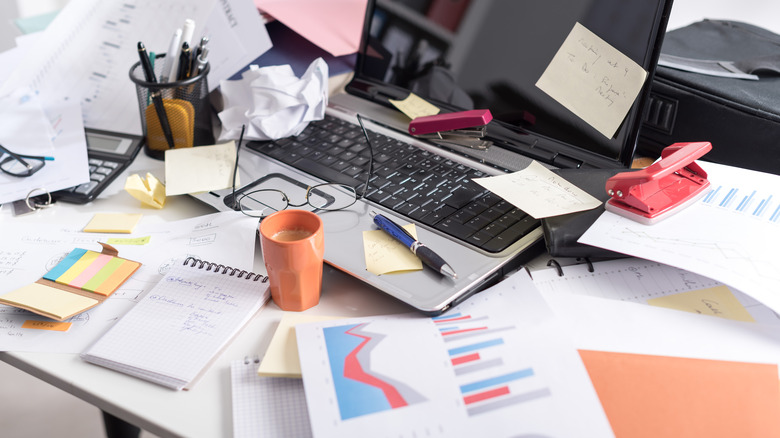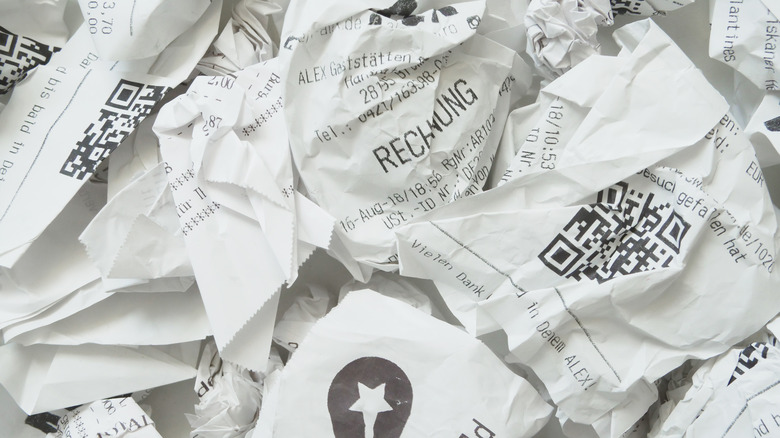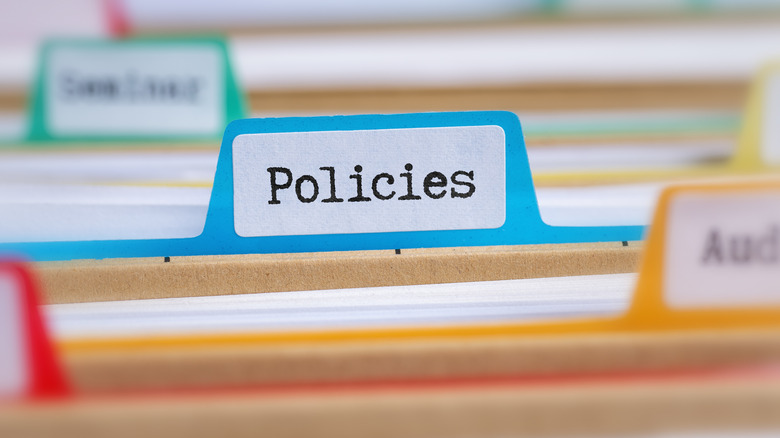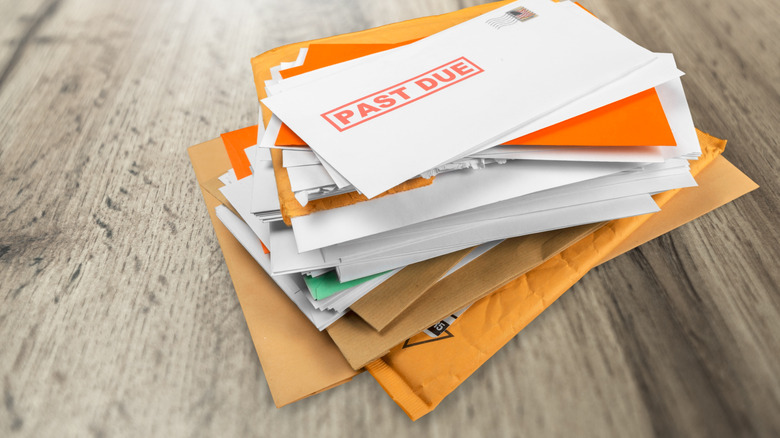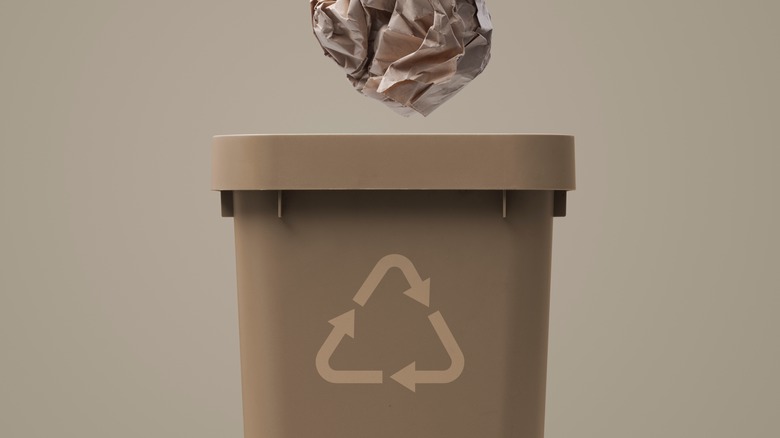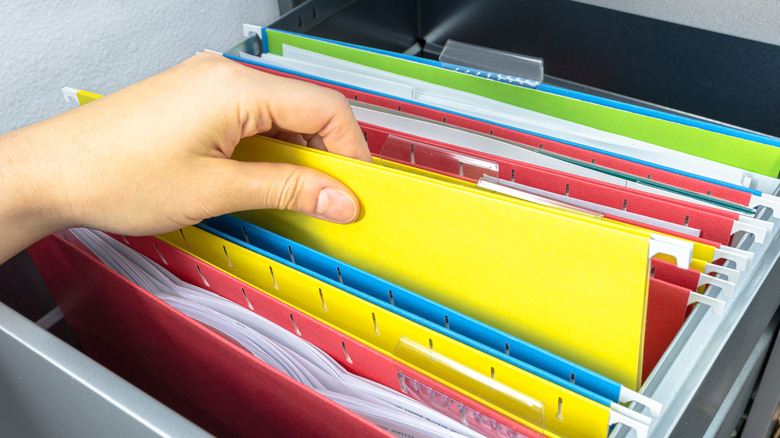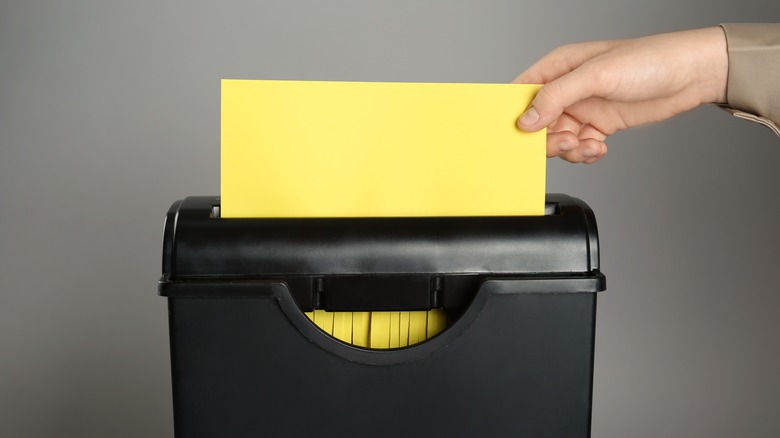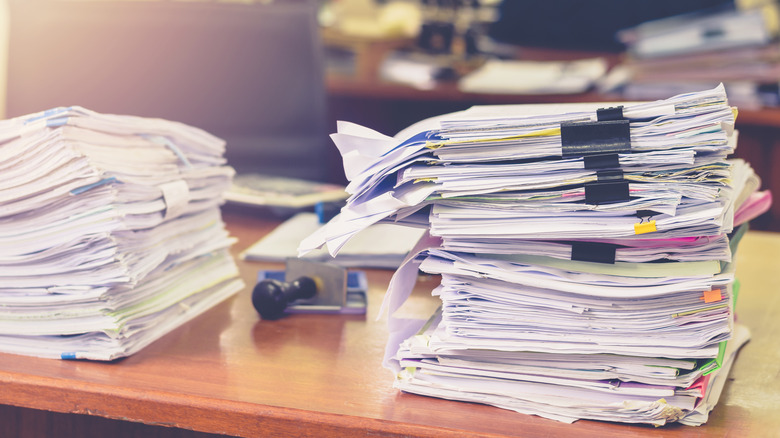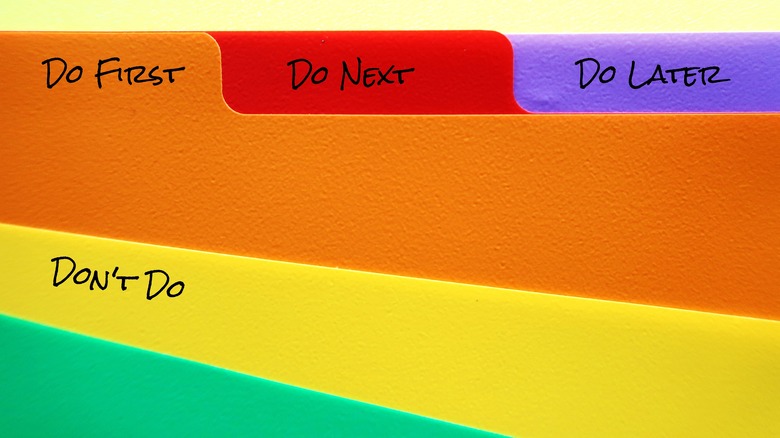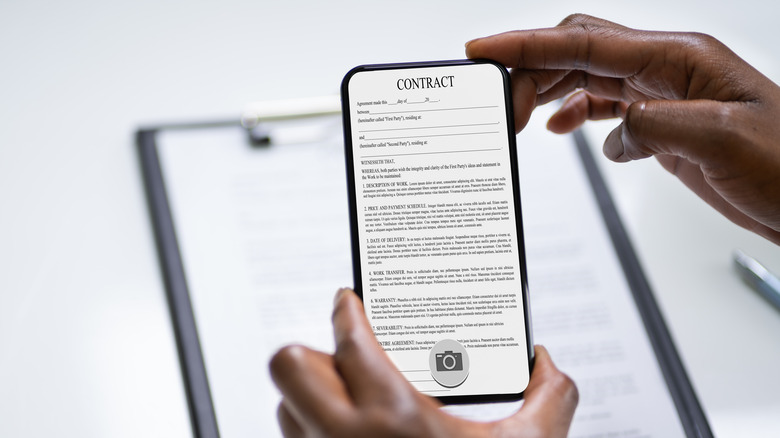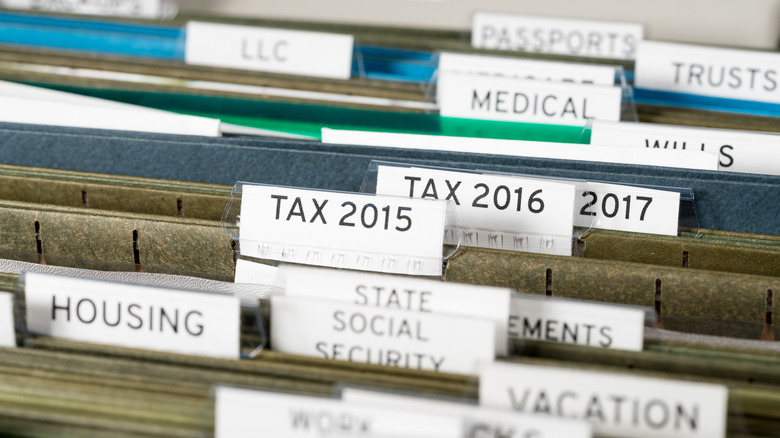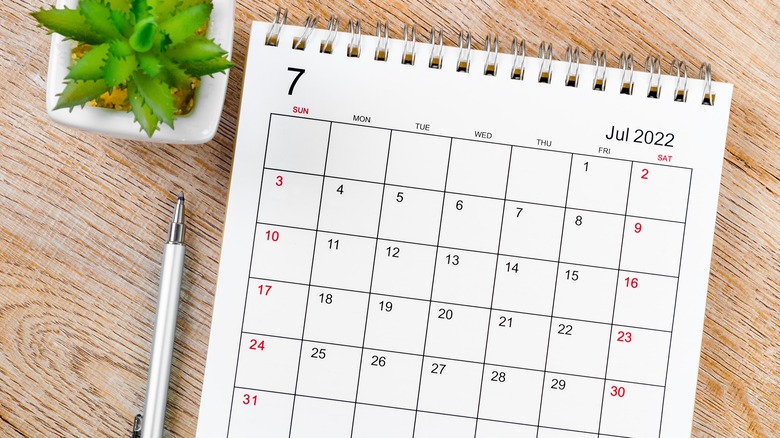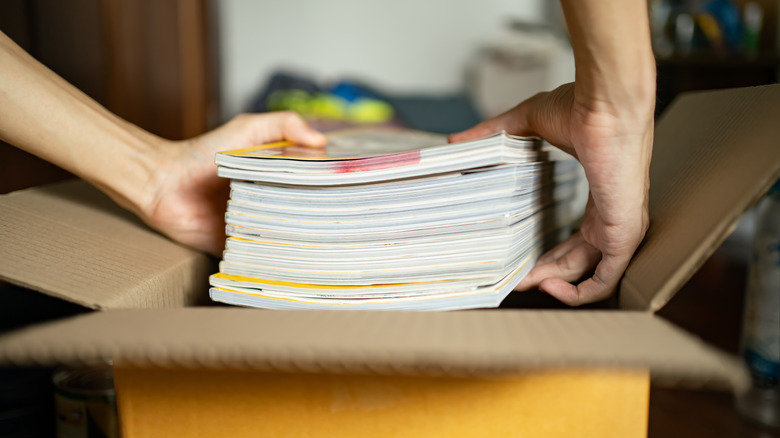Mistakes People Make When Organizing Papers
Believe it or not, paper is one of the most challenging types of clutter to organize. Since paper is small, many people think it doesn't build up as quickly. However, if you're not careful, it can take over surfaces of your home that you need for other things. How many times have you sorted through a pile of mail only for a new stash to build up a few days later? How often have you recycled outdated documents, only for a bunch of new ones to fill the space?
When dealing with paper clutter, one of the first things you need to create is a streamlined system tailored to you and the amount of paper you have. According to The Simply Organized Home, the best way to keep on top of paper clutter is to deal with it immediately. If that's impossible, you need to find a method that works for you that's simple and easy to maintain. To ensure you have a firm grasp on dealing with paper, here are some mistakes to avoid when making your home more organized.
Storing paper for too long
Do you have receipts from items you purchased three years ago? What about manuals for furniture you don't have anymore? One of the first steps to organizing paperwork is to recycle any outdated pieces. Paper is one of the easiest things to recycle, yet we let it accumulate in our homes. We fear throwing something away on the off chance that we might need it. However, the truth is that day rarely comes. So how long should you hang on to papers?
According to Better Money Habits, the amount of time you should keep a piece of paper depends on what it is. Keep tax documentation for three to seven years, but tax returns forever. Pay stubs and credit card statements are good to hold onto for a year, but you can recycle utility bills and deposit slips one month later. Other documents to keep secure include birth and death certificates, life insurance policies, wills, social security cards, and marriage licenses. Ensure you know where your important documents are and which ones you can recycle after a certain period of time.
Not labeling files and folders
File organization is a significant part of getting your paper clutter in order. It can help you locate items faster and keep them neat and secure in a single place. However, people often mislabel files, which defeats the purpose. While the idea of labeling everything in your home might feel a little overwhelming, it's essential to at least label your files. But don't think you need to give them boring names like "Banking" or "Tax Information." According to Dexterous Organizing, labeling can be a fun and creative project.
If your brain thinks straightforwardly, then labeling files is your best option. This way, you know everything in the "Manuals" folder is exactly what it says. However, if your brain functions more creatively, you can play around with wording and make your files unique. For example, you can name a file that houses your credit card statements as "Don't Take My Money!" Or you can call a folder with birth certificates something like "The Day We Were Born." Having fun with labels will make the process a little less boring and give you a good laugh every time you read the name.
Letting mail pile up
A common mistake everyone makes when organizing paper is not having a system to deal with incoming mail. We all get mail. Most of it we don't want, but rather than recycle it right away, we toss it on an evergrowing pile that requires more attention than it gets. Don't wait months for your mail pile to turn into a leaning tower before sorting through it. Make it a habit to go through and organize mail at least once a week, if not every day. The Order Expert says separating mail into categories is a great way to see what you have from a birds-eye view.
Putting them into piles like bills, personal, magazines, and junk shows you what needs attention and what can be recycled. Once you have the mail sorted into these piles, don't just leave them. Recycle or shred junk mail immediately, and then put bills where you can see them. Personal mail and magazines should also get their own homes like a vertical box or wall organizer. Once you have a system in place for dealing with mail, you will find it much easier to keep on top of paper clutter.
Keeping a recycling bin nearby
Paper is one of the easiest things to recycle. Since it's often small and light, you can fit a lot in a box or bag. However, many people don't keep a recycling bin on hand. Rather than recycling paper, they either leave it on the surface or throw it in the trash. Yes, even those tiny scraps of paper you jotted a phone number down on can be recycled. Per Conserve Energy Future, paper recycling involves repurposing old paper into new. The scraps from calendars, planners, magazines, and notebooks are all used to create new products.
To ensure you're recycling paper at every chance, set up a bin near where you tend to collect paper. These spots might include a home office or your kitchen if that's where you tend to sort your mail. Do you read magazines in the living room or your bedroom? Keep one in there so you can toss it right in after reading. Keeping a recycling bin nearby means you're more likely to recycle paper when done with it. This habit will keep more paper out of landfills and repurpose it into new products.
Not keeping files in one place
Depending on the number of folders you have, you might want to invest in a small filing cabinet to keep everything in one convenient place. Steel cabinets are a simple and quick solution. They come in a variety of sizes and colors so you can find the best one for your space and needs. They'll protect your paperwork in case of a fire or emergency. Before you decide on a cabinet, The Order Expert suggests figuring out how you will use it. Creating a system before buying will ensure you'll utilize the piece to its full potential.
If a filing cabinet sounds too big for your needs, you can always get a single box for your paperwork. The folder organization method will vary from person to person and family to family. Some might have a ton of paperwork, while others have very little. A box can be perfect for those with limited paper and space. Marie Kondo offers a stylish vault for organizing your important papers. In the end, how you store folders is up to you. So long as you keep them all in the same place, finding them when needed will be a breeze. Another popular method is creating binders for specific paperwork. You can create a tax binder, financial binder, or work-related one.
Not shredding sensitive documents
Earlier, we talked about keeping tax documents for three to seven years. When the time comes to recycle them, it's essential to shred them rather than toss them loose in the recycling bin. Many people overlook shredding because they either don't have access to a shredder or don't have enough papers to shred. However, it's best to shred any piece of paper that contains sensitive information, including your name, address, phone number, or credit card number.
According to DataShield, criminals still search through trash, and if they find sensitive information such as your social security number or bank statements, they can use that for identity theft. When you shred important documents, you're also making it easier for those scraps to be recycled. You'll want to check your town's recycling guidelines because when it comes to shredded paper, many prefer them to be in separate bags and stapled shut to prevent scraps from flying out. The next time you're about to recycle something with sensitive information, save it for shredding. Consider buying a small one for your house or bring it to a local shredding company.
Keeping everything on your desk
Whether you work from home or in an office, if you tend to collect a lot of paper on your desk, consider adding a tray to put it all in. This way, it's out of your way and in one place when you're ready to sort through it. As mentioned, paper may not seem like something to worry about, but it often accumulates quickly. Before you know it, you can have a pile of papers on your desk, taking up valuable real estate. According to The Washington Post, an organized desk is vital to keep paper clutter under control.
You don't have to go crazy and clear everything off your desk to stay organized. You should have a system for what you'll do with all the paperwork that lands there. A simple tray is best if you're someone who doesn't have time to sit and organize it all. You can toss every single piece of paper in there and then spend twenty minutes or so going through it at the end of the day. Another option to tidy up your office desk is a three-tier tray where you can separate paperwork into categories. Depending on your job, you can label those tiers as "Important," "To Be Filed," and "Done." How you organize your desk is up to you, but having a system will keep your desk and mind clear to focus on work.
Not creating an Action folder
While most of the paperwork you deal with daily might be time-sensitive, it's not always urgent. You may need to refer to it at a later date. However, some paperwork requires you to take action within a few days, whether it's paying a bill, signing a document, or replying to a message. David Allen, author of "Getting Things Done," calls this "Action" paperwork. For best results, keep a separate folder for all your papers that requires some form of action.
You can go one step further and organize your action documents with labels like "Urgent To Dos" (via The Sunny Side Up Blog). Your aim is to create a single folder that will hold everything you need to do as soon as possible. It's best to keep it somewhere you'll see it every day. Making it visible will remind you that the paperwork is important and should be taken care of quickly. You can also schedule a day during the week to go through and handle anything inside. This habit will help you stay on top of paper and any other bills or time-sensitive material.
Not using digital options
Although you should keep some paper as a hard copy, you can eliminate a lot of clutter by scanning and storing certain things digitally. Many people prefer to pay bills and shop online, so most of their paperwork comes through email. Instead of deleting them, it's good practice to start saving these emails on the off chance you need to check the return policy or refer to something later. One way to do this is by creating a label in your email. Remember to declutter it every so often. Otherwise, it'll be full of old and outdated receipts.
If you want to decrease your current amount of paper while holding on to some things, Order Your Life suggests getting yourself a ScanSnap. It's one of the best scanners on the market. Don't think you're limited to tax documents and insurance policies. You can scan school artwork, old postcards, journals, and other essentials. Storing paper digitally saves you physical space and should be given as much time and attention as hard copies. If you decide to move to digital storage for paperwork, make sure you name files to make them easy to find and create folders as you would for regular paperwork.
Not choosing paperless statements
As mentioned, storing papers digitally is an ideal method to organize and stay on top of paper clutter. If you're new to digital storage, you can begin by choosing paperless statements through your bank and credit card companies. Most credit card companies will offer paperless statements when you sign up for a new credit card. Some even include a paper fee of $1.00 or more to persuade you in the digital direction. That's why you should accept the paperless option. It means fewer bills in the mail and less paper to organize.
However, if you choose paperless statements, you still need a system to ensure you pay bills on time. The Busy Budgeter suggests creating a bill box or folder. If you still get paper bills, store them in a visible place like a desk or side table. If you're going the paperless route, having a folder in your email will suffice. You can also schedule a day in the week where you look through the folder and take care of any upcoming bills.
Creating too many categories
When organizing paperwork, it's possible to go overboard. Not necessarily by keeping unnecessary paper, but by creating too many categories. Yes, you can have fun with labels and create fun names for things, but if you're not careful, you can get carried away and end up with dozens of folders with only a single piece of paper inside. That's something you want to avoid. Your goal is to have enough folders to store your important documents but not too many categories that you need to keep buying new folders.
If you fear falling into this trap, Abby Organizes recommends using the KonMari Method to create paper categories. Separate paper into three groups: papers in use, limited-time paperwork, and papers to keep indefinitely. The first two categories should include papers you will eventually recycle, like receipts, work orders, warranties, and tax forms. The indefinite pile will contain birth and death certificates, passports, and licenses. Remember, you don't have to stick with this system forever unless it works for you. It's just a good place to start.
Recycling old planners and calendars
People like to hold on to old planners and calendars for many different reasons. A calendar might be a collage of family photos you want to keep for sentimental purposes, or your planner might be full of ideas you want for future reference. However, if you hang on to old calendars and planners, they can quickly take up precious space in your home and start collecting dust. Another reason people don't recycle planners and calendars is they often feature several different materials.
Most pre-printed planners have plastic covers, metal binding, and paper inside. So how do you recycle the paper when there's another material attached? According to Blue Sky, it requires a little bit of patience and disassembling. You can follow a four-step process and separate individual components into recyclable and non-recyclable groups. Some planners on the market are 100 percent recyclable, while others will take some extra steps. Once a planner or calendar outlives its dates, don't be afraid to recycle it. Remove any notes you want to refer to and recycle the rest.
Not decluttering paper regularly
Since paper clutter can build up quickly, it's essential to set a schedule for decluttering. One of the biggest mistakes people make when organizing paperwork is not going through the stack they choose to keep. You may store away a warranty that's good for a year, but if you don't recycle that warranty when it expires, that's like keeping unnecessary paperwork.
According to Simplify 101, you can declutter paper 15 minutes at a time. If you find it difficult to set aside a specific day to sort through everything, you can do it in 15-minute intervals. When you make it a habit to declutter paper regularly, you will naturally stay ahead of the clutter. You're taking the necessary steps to deal with it, which is something many people opt not to do. Once you get your paperwork arranged in an organized fashion, try to maintain that system for as long as possible. Rest assured that when a method stops working, you can easily find a new one to replace it.
